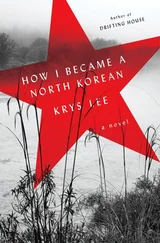They were thumping at the door in a frenzy; I don’t know how it withstood the onslaught … They were shouting my name, they had been shouting for hours … with Mom and Dad’s voices … Even the voices! But slightly different, slightly hoarse … They had drunk cognac at the wake, and they weren’t used to it … they were going crazy … They had lost the key, or left it somewhere … some story … their lying was so transparent … They were insulting me! They were saying awful things! And I was crying, horrified, dumb, transfixed …
Dad jumped over the wall into the yard, he went to the kitchen door and started beating on it, kicking it … I walked through the darkened house, like a sleepwalker, stopped in front of the kitchen door and prayed to God it would hold … and my prayer was answered, for once … he went back to the front door …
Even if I’d wanted to let them in, how could I? I was locked in. I didn’t have the key … Or did I?
That was beside the point. Did I want to let them in or not? Of course not. They hadn’t fooled me … Or had they? How could I tell? They were exactly like my parents, more real than the real thing … I kept my eye to the keyhole, hypnotized by that unreal scene … But there they were in the midst of that unreality, my parents, it really was them … Not just their masks, but also their expressions, their tics, their style, their stories … That was how I saw my parents, especially Dad … it was different with Mom … I didn’t see Dad’s outward appearance as other people did … I saw the way he was, his past, his reactions, his reasoning … it was the same with Mom, now that I think of it … not that I was especially insightful, but they were my parents, so they had no form, or didn’t reveal it to me … or wouldn’t … that was the tragedy of my childhood and my whole life … My vision couldn’t be satisfied with what was visible, it had to go rushing on, beyond, into the abyss, dragging me along behind …
The blows were deafening, the house was shaking on its foundations … the shouts grew louder … they were telling me in no uncertain terms … without words now … but I could understand anyway … But can’t you see it’s us? Can’t you see it’s us, you idiot? Idiot!
No! My parents wouldn’t talk to me like that … they loved me, respected me … and yet … sometimes they lost their temper … I was a difficult girl, a problem child in a sense … and the assailants knew that, they were using it … all the world’s evil was the clay from which they had molded those two ghastly dummies …
What would become of me? Would I fall into their hands? Would they get in? Would I open the door in a reckless moment, without thinking, prompted by an idiotic optimism …? Would I believe them?
How could I tell? That was the worst thing: there was no end to it … Or rather: there was. Because if the only thing missing had been the end, in a way I could have stayed calm, waiting for it … putting it off, leaving it for later … But the waiting was the end! It was and it wasn’t … It almost seemed like nothing at all. Because I couldn’t see anything, the delirium wasn’t strong enough, or it was too strong … I couldn’t see the house in which I was trapped, I couldn’t see the horrendous mannequins besieging it … the souls of Mom and Dad … It wasn’t a hallucination … If only it had been: what a relief! No, it was a force … an invisible radiation …
It lasted a month. Amazingly, I survived. I could say: I woke up. Coming out of the delirium was like being released from prison. It would have been logical to feel relieved, but I didn’t. Something had broken inside me, a valve, the little safety device that used to allow me to switch levels.
WHEN I REGAINED consciousness, I found myself in the pediatric ward of the Rosario Central Hospital.
I opened my eyes and found myself in a world that was new to me: the world of mothers. Dad didn’t come to visit me once. But every single day I waited for him, with a mixture of longing and apprehension that prolonged my delirious trains of thought in a milder form. Mom came, though, and the scent of terror she brought with her was like Dad’s shadow. There was no escaping it, because now I was locked into the system of accumulation, in which nothing is ever left behind. I didn’t ask her about him. She was different. She seemed distracted, worried, anxious. She didn’t stay long; she said she had things to do, and I understood. The other beds were attended twenty-four hours a day by mothers, aunts and grandmothers taking turns. I was alone, a daughter abandoned in a maternal realm.
There were about forty children in the ward with me, with all sorts of conditions, from broken bones to leukemia. I never counted them, or made any friends; I didn’t even speak to any of them.
It took them forever to discharge me, so all the beds were vacated and reoccupied during my stay, ten times or more in some cases. There were all sorts, from kids who seemed to be in excellent health and made a phenomenal racket, to others who were listless, lying still or asleep … I was in the second category. I was so weak I couldn’t move, and permanently drowsy. A kind of lethargy would set in mid-afternoon and last for hours. I didn’t even swivel my eyes. Sometimes it went on for whole days or weeks; I could feel myself falling back into that state without having come out of it, at least not consciously … And it was a very long way to fall …
Every day, just at the worst time, or the beginning of the worst time, the doctor came to visit me. He must have been interested in my case; survivors of the cyanide poisoning were rare. I once heard him pronounce the word “miracle.” If there had been a miracle, it was entirely involuntary. I was not cooperating with science. An urge, a whim or a manic obsession that not even I could explain impelled me to sabotage the doctor’s work, to trick him. I pretended to be stupid … I must have thought the opportunity was too good to waste. I could be as stupid as I liked, with impunity. But it wasn’t simply a matter of passive resistance. Doing nothing at all was too haphazard, because sometimes nothing can be the right response, and I was determined not to let chance determine my fate. So even though I could have left his questions unanswered, I took the trouble to answer them. I lied. I said the opposite of the truth, or the opposite of what seemed truest to me. But again it wasn’t simply a matter of saying the opposite … He soon learned how to formulate his questions so that the answer was a simple yes or no. If I had always lied, he would have started translating every answer into its opposite. I considered it my duty to lie every time; so in order to protect myself, I had to proceed in a roundabout way, which isn’t all that easy when you have to reply yes or no, without hedging. On top of this, I had resolved never to mix any truth with my lies. I was afraid that if I lost track, chance would be able to intervene. I don’t know how I did it, but I managed somehow. Here are some of my tricks (I don’t know why I’m explaining all this, unless I’m hoping to inspire other patients by my example): I pretended not to have heard a question, and when he asked another, I replied to the first one, with a lie, of course; I replied, always fallaciously, to one element of the question, for example an adjective or a verb tense, not to the question as a whole; he would ask me “Is this where it was hurting?” and I would answer “No,” while suggesting with an ingenious movement of my eyebrows that the place in question was not where it was hurting before, but where it was hurting now. He picked up all these signals — nothing was lost on him — and despondently rephrased his question: “Is this where it’s hurting?” But by then I had already moved on to a new system, a new tactic … I should say in my defense that I was making it all up as I went along. Although I had veritable eons of time in which to think, I never used that time to plan my lies.
Читать дальше












